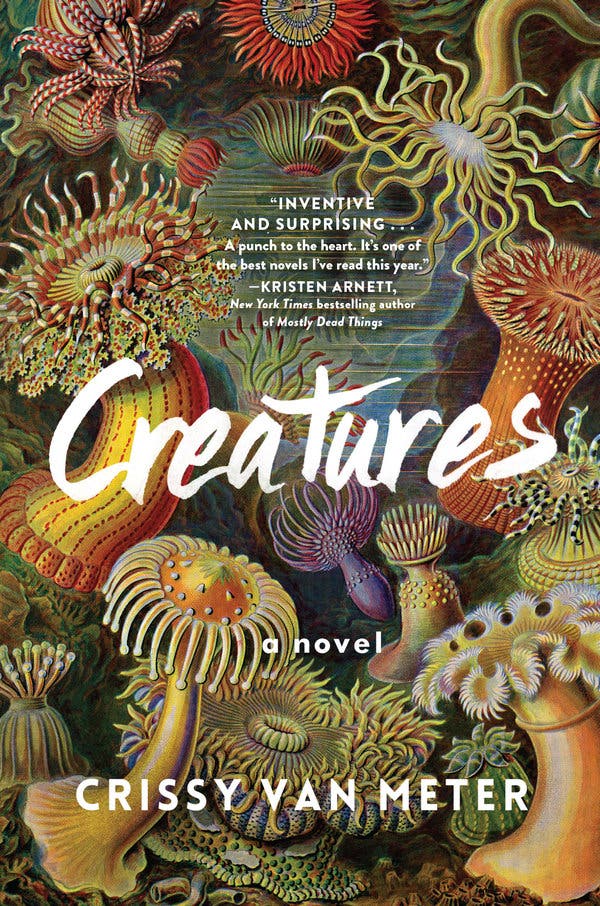CREATURES
By Crissy Van Meter
“Creatures,” Crissy Van Meter’s vivid and moving debut, is a novel powered by atmosphere. The perils of Winter Island, a 40-mile ferry ride from Los Angeles, shoot through each sentence like an electrical current. A whale rots in the “half-moon of the bay” as the island is battered by a tsunami, an earthquake and tourists. But this is also a landscape of wondrous beauty, a “mound of volcanic rock half-carved by glaciers, full of lush green forests and sweeping sandy beaches.”
The characters are as complex and explosive as the setting. Evie was raised on the island by her magnetic but reckless father, who has a talent for tall tales and growing really good weed, and whose “absolute charm,” Evie recalls, “was our survival.” Yet charm proves to be an unpredictable currency; weather, for one, is indifferent to the force of personality. Evie and her father are periodically homeless, left to fend for themselves in the elements, either because a storm has sunk their boat dwellings or because of his drug addiction. Evie grows up too fast — by 13 she’s carrying her dad’s pot in her backpack — and yet remains stranded in a state of arrested childhood. One night father and daughter sleep outside in the cold — just like “pirates” or “explorers,” he says — playing cards and sipping whiskey from paper cups. “I wasn’t a kid,” Evie later reflects, “but we both had to be kids to survive.”
In “Creatures,” there are two kinds of people: those who stay on Winter Island and those, who either have or seek greater economic opportunity, who leave. Even during Evie’s periodic stints on the mainland, the island is never far from her thoughts, with her like a pulse. Her mother, one of the defectors, flits in and out of her daughter’s young life, sometimes going years between visits, and usually staying just long enough to disrupt whatever uneasy status quo Evie and her father have scraped together. In the novel’s opening, past and present collide when an adult Evie, now a researcher at the Sea Institute, returns home to find her mother on her doorstep. Right away, Evie notices that she is “soaked” and her mother “dry,” a clear metaphor for the difference between them. Also: It’s the night before Evie’s wedding and the groom, Liam, might be lost at sea.

As “Creatures” unfolds, Van Meter subverts narrative expectations by making long and frequent digressions away from the compelling present, pre-wedding story line, to reveal either the past or future. Interspersed throughout are chapters framed as responses to essay prompts (“Is a sperm whale vengeful?”; “Describe the world’s loneliest whale”), the novel intertwining Evie’s profound knowledge of the sea with her own personal history. Many of these passages are rendered in the second person, attributing to the unnamed “you” thoughts too fraught for the “I” to confront.
 EU News Digest Latest News & Updates
EU News Digest Latest News & Updates



